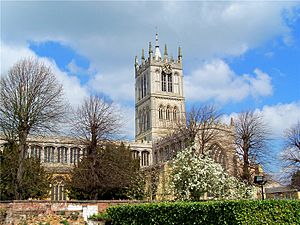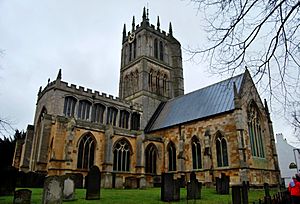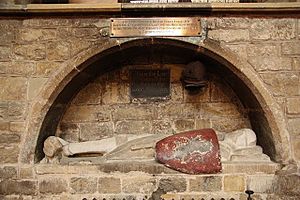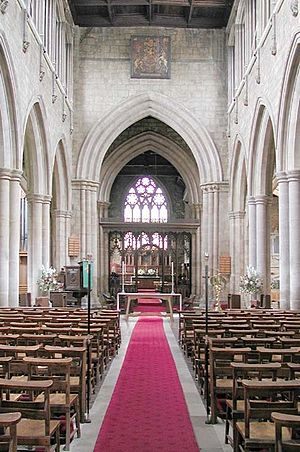St Mary's Church, Melton Mowbray facts for kids
Quick facts for kids St Mary's Church, Melton Mowbray |
|
|---|---|

St Mary's Church
|
|
| 52°45′49″N 00°53′11″W / 52.76361°N 0.88639°W | |
| Country | England |
| Denomination | Church of England |
| Churchmanship | Broad Church |
| History | |
| Status | Active |
| Dedication | St Mary |
| Architecture | |
| Functional status | Parish church |
| Heritage designation | Grade I listed |
| Designated | 24 October 1950 |
| Administration | |
| Parish | Melton Mowbray |
| Deanery | Framland |
| Archdeaconry | Archdeaconry of Leicester |
| Diocese | Diocese of Leicester |
| Province | Province of Canterbury |
St Mary's Church is the main church for the town of Melton Mowbray in Leicestershire, England. This large, old church is known as one of the best parish churches in Leicestershire. After some tough times and needing a lot of repairs, it was fully renovated by late 2017. The work made the church much easier to use and safer. It included a new floor, heating, and a modern sound and lighting system. The historic organ was also rebuilt. All these improvements cost about £2 million.
What Makes St Mary's Church Special?
St Mary's Church is the biggest and most impressive parish church in Leicestershire. You can see parts of the building that date back to the 13th to 15th centuries. The very bottom part of the tower has Norman windows from around 1170. However, there were likely even older churches on this spot before the Norman one, built by the Anglo-Saxons.
The church's design is more like a large cathedral than a typical parish church. Its tower is 100-foot (30 m) tall and stands out in the town. It's also one of only five parish churches in the country with "aisled transepts." This means it has extra side sections that are usually only found in very large cathedrals.
Inside, you can find many interesting monuments. These include the tomb of Roger de Mowbray, 1st Baron Mowbray and others from the 14th to the 18th centuries. There's also a special plaque for John Ferneley, a famous artist who painted horses. The church also has a large choir with about 40 members who sing beautifully.
The Church Bells and Chimes
The church tower holds ten bells. The oldest bell (number 6) was made by John of York in the 14th century. Most of the other bells have been remade over time. Until 1802, there were only six bells. Two more were added then, and another two in 1894, making a total of ten. There is also a small sanctus bell from the 17th century.
The church also has a carillon, which is a musical instrument made of bells. It plays chimes three times a day. The carillon was fixed up in 1938 thanks to a gift from Alice Henton. This repair included a new clock, replacing an older one from the early 1800s.
The Amazing Church Organ
A new organ was put into the church by John Gray of London and first played on September 30, 1832. It was designed to look like two Gothic towers. In 1849, the organ was made bigger by Groves and Mitchell. It then had 27 "stops" (which control the sounds) and was moved to either side of the main church area.
The organ was made even larger in 1897 by William Hill and Son. It became a huge instrument with 39 stops and three "manuals" (keyboards) plus pedals. In 1929–30, Haydn Morton worked on the organ, adding new parts to make it easier to tune and maintain. The console (where the organist sits) was moved to a different part of the church.
In 1955, the organ was rebuilt again by J. W. Walker & Sons Ltd. Most recently, in 2018, Henry Groves & Son completed another big rebuild. They added new sounds, including a powerful 32-foot Contra Trombone, making it an even more impressive instrument with 69 stops.
 | DeHart Hubbard |
 | Wilma Rudolph |
 | Jesse Owens |
 | Jackie Joyner-Kersee |
 | Major Taylor |




